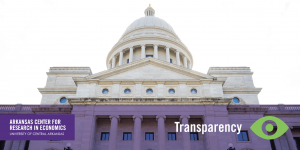By Caleb Taylor
How can local governments discourage corruption among public officials?
Create more systems that provide for checks and balances, says ACRE Policy Analyst Joyce Ajayi in “Curb temptation” published in the Arkansas Democrat-Gazette on July 16.
Ajayi writes:
In his book “Principles of Fraud Examination,” Joseph Wells, the founder and chairman of the Association of Certified Fraud Examiners (ACFE), points out that generally, employees don’t set out to be corrupt from the outset.
However, when employees experience financial pressure with weak organizational controls or rules, it is easy for them to develop rationalizations for fraud.”
Ajayi cites the case of April Michelle Poor, a Marvell-Elaine School District bookkeeper, who embezzled $471,665 from the district as an example of these “weak organizational controls.”
Ajayi writes:
Her embezzlement caused teacher and counselor layoffs and nearly shut down the district. Interestingly, some community members described Poor as a good lady who volunteered in the community and sang in the choir. She was the last person in their small community anyone believed would commit fraud.
Yet Poor committed fraud by issuing 92 checks to herself from July 1, 2014, to December 31, 2018. She hid the payments in the district’s accounting system by making false entries indicating she used them to pay utilities, and altering bank statements.”
Ajayi recommends improving “transparency and adhering to generally accepted accounting principles” as a means of stopping corruption.
Ajayi writes:
To prevent corruption, governments should create more systems that provide for checks and balances. When public officers are aware that their actions are being watched closely, it will undoubtedly improve their behavior.”
For more of our research on transparency, go here.

